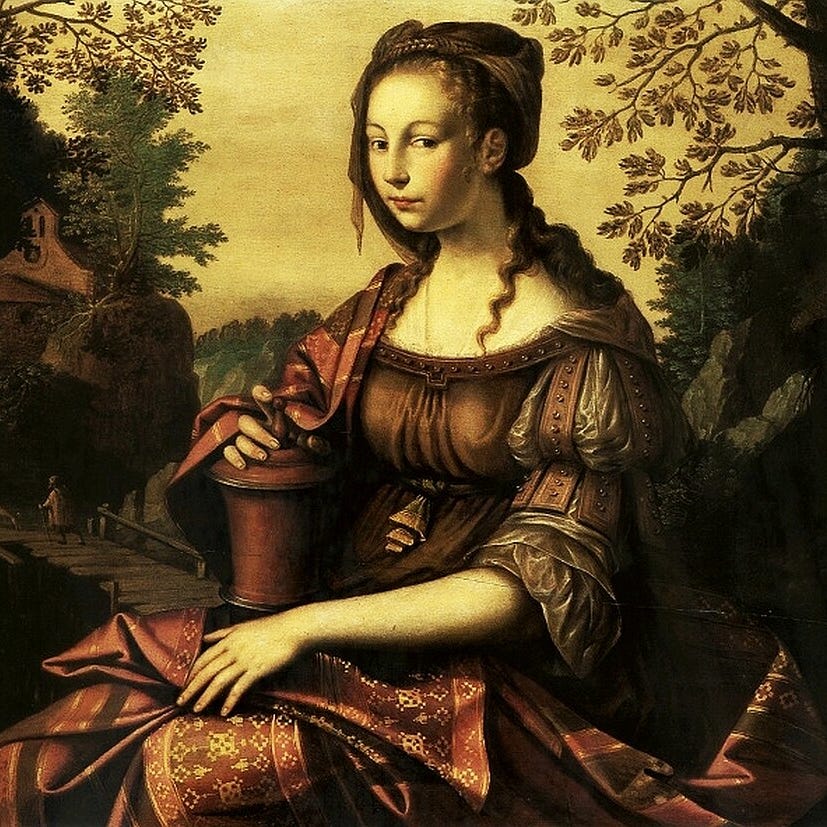Good Country People
Flannery O'Connor's juxtaposition of metaphysics with Heidegger's "the Nothing."

Welcome! This post is free. If you are a free subscriber, consider an upgrade to support my work and view all posts in this newsletter. Thank you for being here!
I have an interesting thought on Flannery O’Conner’s short story, Good Country People. After rereading the story, I began rereading Heidegger’s 1929 inaugural lecture at Freiburg University titled, “What is Metaphysics?” This is the material Flannery is paraphrasing (or, perhaps using a different translation, so I think). It’s impossible to know from Flannery’s stories and letters what her interpretation of Heidegger is. Though, I think in this story, it does not matter whether we agree on our Heideggerian exegesis or not. She does something interesting.
One-legged Hulga is the non-metaphysical Heideggerian. Conversely, door-to-door Bible salesman Manley Pointer presents himself as the innocent “Chrustian” metaphysician. Heidegger himself was not an enemy of metaphysics per se; he only wanted to get to a deeper understanding of human experience and believed that metaphysics had “covered over” this experience. Through metaphysics, we had “forgotten about” Being in its primordial sense. Heidegger looks to “the Nothing” beyond metaphysics to find that deeper understanding of human existence. One must keep the above in mind when contemplating Hulga's and Manley’s relationship.
It’s not clear if Flannery, i.e., Hulga, shares that nuanced understanding of Heidegger’s relationship to the rational and metaphysical. Hulga certainly has an attitude that leads me to believe she has yet to discover the deeper meaning of her own human existence. She’s resentful and filled with intellectual pride that oddly relates to her wooden leg. Hulga’s most intimate surrender is to let Manley take it off, and her greatest phobia is the thought of not being able to retrieve her leg and put it on again. There are several Heideggerian allusions there, but the most important one is Hulga’s “the Nothing beyond metaphysics” facing off with Manley’s innocent “Chrustian” metaphysics.
However, all is not what it appears.
Hulga is confident that she can “destroy metaphysics” by intellectually overpowering the “Chrustian” metaphysician. Hulga believes she can intellectually overpower the “Chrustian” metaphysician and destroy metaphysics, regardless of any Truth, Beauty, and Goodness that Manley’s bible-based metaphysics may reveal. She plans to show the inadequacy and futility of that metaphysics through her appeal to the Heideggerian concept of “Nothing.”
Shockingly, however, we discover that Manley Pointer, the bible salesman, is in reality a fraudulent, psychotic liar with a fetish for taking what is most intimate from his female victims. In a word, he is evil. Hulga has no answer for evil. She had been prepared to defeat the metaphysics of the good. Confronted by evil, her angry, prideful, manipulative confidence melts into pleading, fearful surprise. The dynamics change. Manley tricks Hulga and leaves her one-legged and helpless in the barn loft, disoriented by the metaphysics - not of good - but of evil.
Flannery’s story juxtaposes metaphysics with “the Nothing beyond metaphysics.” However, the operative metaphysics in her story is not the good but evil. A reflection on Heidegger’s “problem” with metaphysics and its “covering over” of the human experience leads to a disconcerting conundrum in Flannery’s story. One cannot dispense with metaphysics in the search for the Nothing. Evil will not allow it. Metaphysics, expressed as evil, is an interminable pest at a picnic for Heidegger.
“Can there ever be a search without anticipation, a search that would end in pure discovery?” ~ Heidegger, Martin. What Is Metaphysics? Jovian Press, 2016. p. 15.
“My heroine already is, and is Hulga.” ~ O’Connor, Flannery. The Habit of Being: Letters of Flannery O’Connor (p. 106).
Visit my home page, Walter Emerson Adams.
Subscribe to my second Substack, The House of New Bethany.
Check out Heroic Hearts, a podcast devoted to St. Joan of Arc and St. Thérèse. Co-hosted with Amy Chase.



